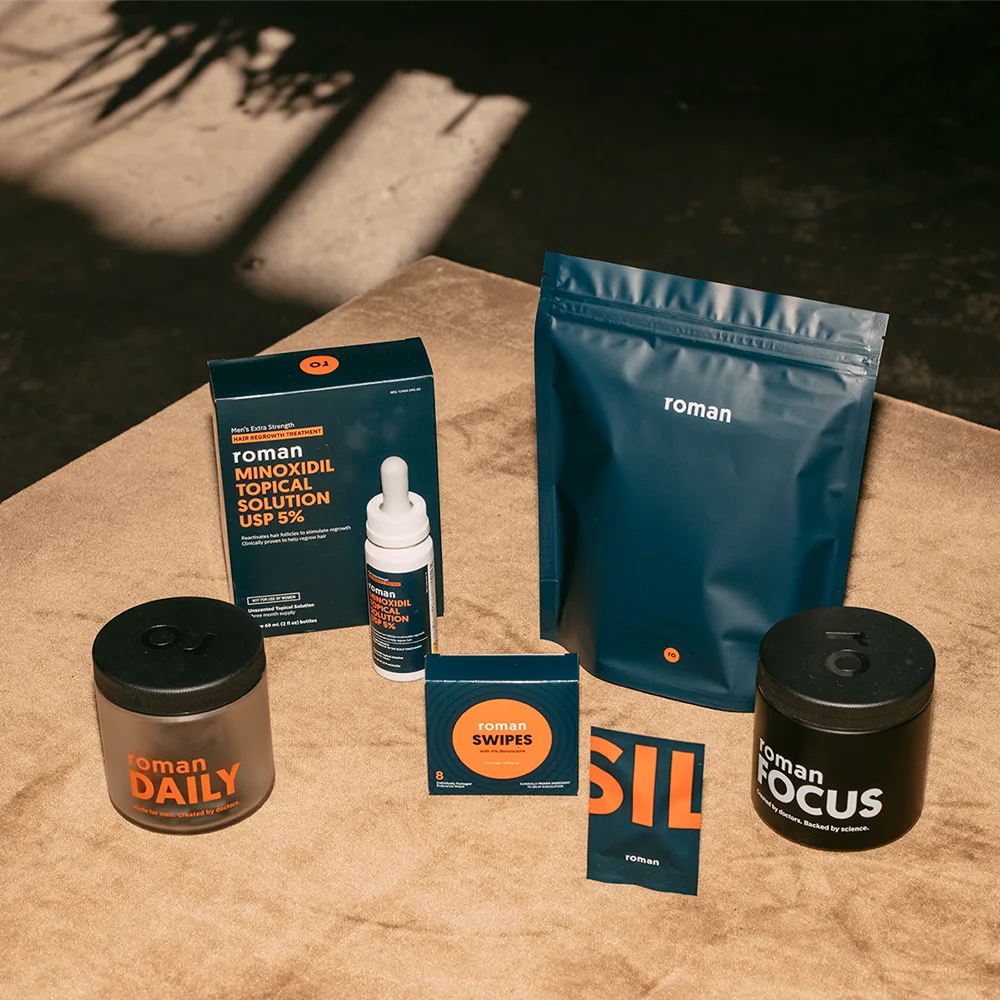Here's what we'll cover
Here's what we'll cover
It’s become a familiar cliche to joke about sex and headaches. The typical trope is a wife rejecting her husband’s advances by saying, “not tonight, honey, I have a headache.” However, headaches associated with sexual activity are very real, not very funny if you’ve ever experienced one, and they happen to be more common in men.
Sex headaches are usually harmless, but the symptoms can mimic more serious underlying conditions. The first time one happens, it can be frightening, causing some people to avoid future sexual activity for fear of bringing on another one (Redelman, 2010).
That’s why it’s so important to know about what causes sex headaches, how to prevent them, and how you can treat them if they happen to you.
What is a sex headache?
Head pain associated with sexual activity has been referred to by many names over the years, including (Cutrer, 2020):
Sexual headache
Benign vascular headache
Coital cephalalgia
Coital headache
Intercourse headache
Pre-orgasmic cephalalgia
Pre-orgasmic headache
Fortunately, they’re relatively uncommon. Sex headaches are thought to affect 1–1.6% of the population. They are more common in males and tend to run in families that experience other types of headaches, such as migraines. They can occur in both adults and teenagers (Cutrer, 2020; Bahra, 2020; Gelfand, 2012).
Types of sex headaches
The International Headache Society calls sex headaches a primary headache disorder and divides them into two subtypes (Bahra, 2020; Utku, 2013):
Pre-orgasmic headaches usually present as a dull ache in the head and neck that gradually increases in severity as sexual excitement increases and the person approaches orgasm. About 20% of people with sex headaches experience these.
Orgasmic headaches are a sudden onset of severe pain (similar to a thunderclap headache) immediately before or at the moment of orgasm. About 80% of sex headaches present this way.
Sex headaches don’t usually occur with every sexual encounter and sometimes only happen with very specific types of sex. They can occur during sex with a partner or with masturbation. Some sex headache sufferers have reported only experiencing them while watching pornography or having an extramarital affair (Bahra, 2020).
Sex headache attacks tend to last a few hours at most. They frequently come in bouts, sometimes with months or even years between attacks. Unlike migraines, there are rarely any other symptoms besides headaches (Bahra, 2020).
What causes a headache during sex?
Medical researchers don’t exactly know what causes sex headaches, but they have come up with many theories over the years. Sex headaches are hard to study because they are so rare, and many people are too embarrassed to discuss sexual activity with their healthcare providers (Cutrer, 2020).
Some of the causes of sex headaches that have been proposed include (Cutrer, 2020):
They may be caused by clenching the neck and jaw muscles during sex.
It could be due to increased blood pressure and heart rate that happens during orgasm.
They may be a variant of migraines.
They may be related to exertional headaches (headaches that happen with exercise).
We don’t know if any of these are correct, but sex headaches tend to occur more frequently in people who also have a history of migraines or exertional headaches (Cutrer, 2020).
Sex headaches are harmless, but since they can mimic other serious medical conditions, you should have a medical workup after your first sex headache to be certain it’s nothing more serious (Redelman, 2010).
Drugs that may cause sex headaches
Several drugs have been linked to sexual headaches, such as (Redelman, 2010):
Amiodarone
Birth control pills
Pseudoephedrine
Cannabis
PDE5 inhibitors (such as Viagra [generic name sildenafil], Levitra [generic name vardenafil], or Cialis [generic name tadalafil])
Viagra Important Safety Information: Read more about serious warnings and safety info.
Cialis Important Safety Information: Read more about serious warnings and safety info.
How do you treat sex headaches?
Most sex headaches go away on their own without treatment. They typically last only a few hours at the most. Many people only have one episode, while others may have them every few months or years (Bahra, 2020).
Triptan medications may shorten severe headache attacks in about 50% of people. Over-the-counter pain medicines such as ibuprofen, aspirin, or acetaminophen given after the start of a headache have been found to have no effect on most people with sex headaches, so don’t be surprised if popping an Advil doesn’t do much (Redelman, 2010).
The medication most commonly prescribed to treat sex headaches is indomethacin, a prescription-strength nonsteroidal anti-inflammatory drug (NSAID). You can take it 30–60 minutes before sexual activity or for sudden severe pain. One potential issue with indomethacin is it can cause potentially serious gastrointestinal side effects, so it isn’t right for everybody (Redelman, 2010; Bahra, 2020).
Can you prevent a sex headache?
For people who have recurring headaches with sexual activity, healthcare providers might order a preventative medication to be taken every day. Some medications include the following (Utku, 2013):
Indomethacin can stop a headache or be taken daily to prevent them if it doesn’t cause any stomach issues.
Beta-blockers are another class of medication commonly used to prevent headaches, including intercourse-related headaches. The most common of these are propranolol and metoprolol.
Nimodipine is a medication called a calcium channel blocker. The Food and Drug Administration (FDA) originally approved it for people who had experienced brain hemorrhage. It has since been studied for other off-label uses, including orgasmic headaches (Das, 2021).
These medications work very well—about 80% of people have good success with preventative medications, especially when taken for about 3–6 months. Your provider will likely tell you to stop the medication at that point to see if the headaches have gone into remission (Utku, 2013; Redelman, 2010).
When to see a healthcare professional
Sex headaches are uncommon, but it’s also felt that they are under-reported because people are too embarrassed to tell their healthcare provider about what they were doing when the headache happened (Redelman, 2010).
You should absolutely see your healthcare provider after your first episode of a sex headache. While sex headaches are harmless, it’s important to rule out other, more serious conditions. Your provider may refer you to a neurologist for a comprehensive exam, which may include different types of tests to rule out any life-threatening or otherwise serious conditions (Redelman, 2010).
Once your provider is sure that you have no underlying causes, you can work together to develop a treatment plan to keep them from coming back so sex headaches don’t get in the way of a satisfying sex life (Redelman, 2010).
DISCLAIMER
If you have any medical questions or concerns, please talk to your healthcare provider. The articles on Health Guide are underpinned by peer-reviewed research and information drawn from medical societies and governmental agencies. However, they are not a substitute for professional medical advice, diagnosis, or treatment.
Bahra, A. (2020). Other primary headaches-thunderclap-, cough-, exertional-, and sexual headache. Journal of Neurology, 267 (5), 1554–1566. doi: 10.1007/s00415-020-09728-0. Retrieved from https://www.ncbi.nlm.nih.gov/pmc/articles/PMC7184054/
Cutrer, F. M. (2020). Primary headache associated with sexual activity. In: UpToDate . Retrieved on Jan. 24, 2022 from https://www.uptodate.com/contents/primary-headache-associated-with-sexual-activity
Das, J. M. & Zito, P. M. (2021). Nimodipine. [Updated Nov 23, 2021]. In: StatPearls [Internet]. Retrieved on Jan. 24, 2022 from https://www.ncbi.nlm.nih.gov/books/NBK534870/
Gelfand, A. A. & Goadsby, P. J. (2012). Primary sex headache in adolescents. Pediatrics, 130 (2), e439–e441. doi: 10.1542/peds.2011-2624. Retrieved from https://www.ncbi.nlm.nih.gov/pmc/articles/PMC8194458/
Redelman, M. J. (2010). What if the ‘sexual headache’ is not a joke?. BJMP, 3 (1):304. Retrieved from https://www.bjmp.org/content/what-if-sexual-headache-not-joke
Utku, U. (2013). Primary headache associated with sexual activity: case report. Medical Principles and Practice: International Journal of the Kuwait University, Health Science Centre, 22 (6), 588–589. doi: 10.1159/000350415. Retrieved from https://www.ncbi.nlm.nih.gov/pmc/articles/PMC5586787/












